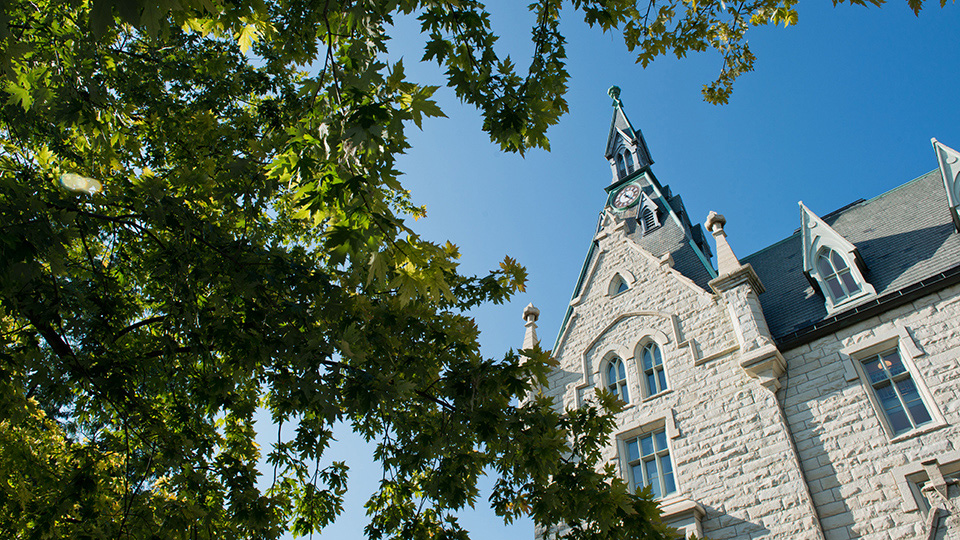Top-of-mind issues across the country are also on the minds of Northwestern staff members: workplace flexibility, keeping up with rising inflation and changing pandemic protocols and more.
Hosted by the Northwestern University Staff Advisory Council (NUSAC), the “Conversations with Senior Leaders” forum was held in person April 6 at Thorne Auditorium on the Chicago campus. Approximately 40 people attended the Chicago campus event in person, and more than 900 tuned in to the live webcast.
“We all know the last couple of years have been challenging, but we are now moving on the other side — let’s hope — of this pandemic, and we are really beginning to refocus all of our energies on all those things we need to do to maintain (Northwestern) as a great employer and a great place to work,” said Lorraine Goffe, newly appointed vice president for human resources and chief human resource officer.
Fielding community questions about what lies ahead for Northwestern were Goffe; Vice President for Research Milan Mrksich, Vice President for Operations Luke Figora and Senior Associate Vice President for Finance and Treasurer Amanda Distel.
NUSAC Chair Joan Trimuel Williams set the stage in her introduction.
“It has been two years since we were able to gather in person for a Conversations event. While we appreciate this moment, we also recognize that many within our community are frustrated, exhausted and looking to senior leadership for guidance,” she said. “Beyond that, many are also grappling with the aftermath and losses from the pandemic and the social injustices.”
Highlights from the Q&A:
What is the current workplace policy?
Goffe: Referencing the message sent March 28 on alternative work strategies, she said, “We are working as quickly as possible to gather information (internally), and we are looking at this on a national level. What’s happening in other organizations across the country and how are they managing this return to the office for some and increased flexibility for most others? We want to make sure that we are getting all of the information we need, and then we will have recommendations for moving forward.
“While it sounds like it might be an easy question to answer, it’s actually quite complicated. Not every job lends itself to remote work or hybrid work. We have to think about the equity piece here as well and what it means to all members of our community.”
Mrksich: “I think it's clear that pandemic period operations have taught the (Office of Research) a lot. As Lorraine says, it’s taught us that many of our staff can very effectively do their work off campus. At the same time, we are also concerned about the equity component since some folks on our teams don’t have the option of working at home.
“As a research university, in-person interaction, collaboration and contact are also important, because a lot of innovation happens in unplanned ways. I think (in-person interaction) is important for staff progression. Many of us have (growth) opportunities in our current units, and our exposure in offices to managers and other units can be an important step to new career opportunities. And for many of us, we found as people have come back to campus — emotionally, it's been healthy and positive to be with people and with the team.
“I expect we will see in five years’ time that we have learned we can work more effectively and with greater flexibility.”
What is Northwestern’s staff retention strategy?
Goffe: “Northwestern is dealing with the nationwide ‘Great Resignation.’ Retention is a key priority. We have created a rapid action committee to look at the root causes for retention. The HR department is also gathering data to align Northwestern’s pay and benefits package with the market.
“Burnout is the other part of this question, and it is a real issue at Northwestern and across the country.
“Well-being takes the help of everyone. At the unit level, leaders need to help employees set boundaries to take time off. It is also important for individuals to set boundaries on their own. We must be clear about what our work schedule is and be able to disconnect.”
What will the new COVID-19 protocols be?
Figora: “All along, we’ve pegged ourselves to the public health guidance. I think we will continue to do that as we navigate what comes next.
“With mask restrictions lifting, our vaccination requirement is the most important protocol. The vaccination rate on campus, it’s one of the highest vaccination rates, not just in the state, but in the country and really in the world.
“Northwestern is probably one of the easiest places in the country to get a COVID test. We think that is also really important. We have widely distributed KN95 masks as well.
“We will continue to work with the Office of Equity and Accessible NU to provide increased flexibility for individuals who are immunocompromised.
“I think we want to give people the tools to make individual decisions to protect their health and safety as we loosen some of the restrictions for the broader campus community.”
Has Northwestern’s DEI hiring policy been effective?
Goffe: “After a year, we will be able to have a sense of how effective it is.
“Diversifying leadership is important and making people feel included in the office environment is important too. We need to communicate across units the work being done locally. We will soon be able to use data to identify pockets where there is less diversity and develop strategies to improve it until it becomes the brand for Northwestern and a place where people feel they belong.
“On a personal level, I think that Diversity, Inclusion, Equity and Belonging has to be solved in many different ways, not just through policy. How do we create an environment where people feel as though they belong and they can bring their best selves to work? If we do all of these things well, we end up in an environment that is truly equitable.”
What insights can you provide about President-elect Blank?
Distel: “I was privileged enough to serve on the Presidential Search Committee as one of the two staff representatives, and so I met President-elect Blank during that process and was very impressed with her from the very beginning.
“I think from my perspective, one of the things that I'm most excited about is I think she brings a data-driven approach along with a warm personality and a Northwestern background.
“In the announcement, I think you all saw that she spent time early in her career here at Northwestern. I think that's just something additionally special that she'll bring.”
The event was co-sponsored by NUSAC, the Faculty Senate and the Office of the President. NUSAC’s final event with President Schapiro is scheduled for May 5 on the Evanston campus.
A video recording of the event will be posted soon to the Office of the President website.


